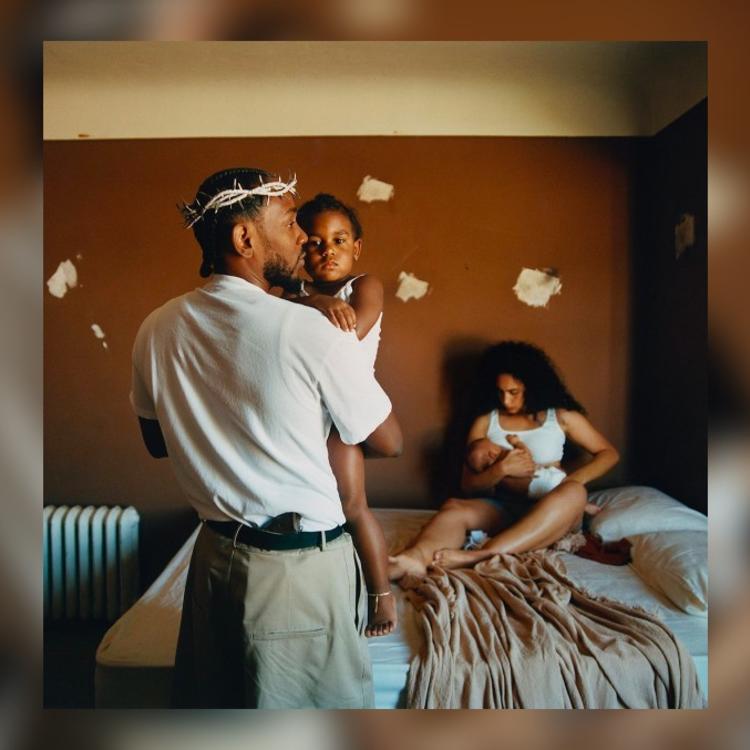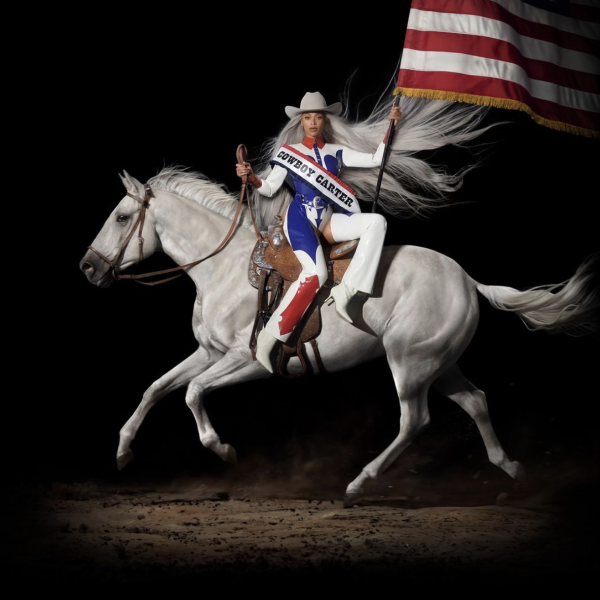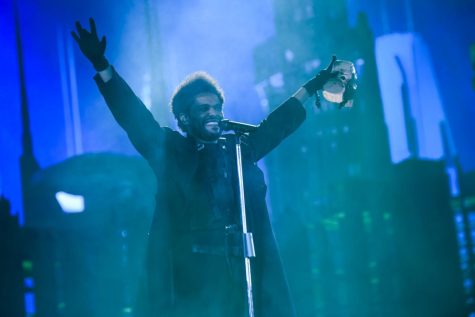Mr. Morale & The Big Steppers, Kendrick Lamar’s first album since 2017, a two-disc offering well worth the wait
Kendrick Lamar’s new album, Mr. Morale & The Big Steppers dropped on May 13, and since then people have been constantly streaming the album. This is a two disc offering, and they both address problems in American society. Some issues Lamar touches on are homophobia, stereotypical Black culture, and traumas that were never addressed. This album is masterfully executed to deliver these messages without overwhelming the listener.
“United In Grief” is the first song on the album. It begins with Sam Dew wishing that Lamar finds “some peace of mind” and then this line is followed by his fiance, Whitney Alford, asking him to tell his listeners the truth. Dew’s and Alford’s appearance on the album adds to the overall effect of Mr.Morale & The Big Steppers. The piano melody is great with Lamar’s aggressive, fast tempo beat. The lyrics also reveal that this is Lamar’s journey through therapy. This deep meaning only adds to the greatness of the song.
“N95” may be the best song on the album. The beat is godly. It has the piano notes, 70’s elements, and techno vibes, as well. Lamar’s lyrics back this beat perfectly. He’s telling people to take off their “mask.” The masks have things like designer clothes and fake personalities: things to make people seem more likable. The beat drops then he then follows these lyrics by claiming those people are “ugly.” Lamar finds that without all those items are without longevity and not worth investing in. Lamar is very clever with his titles as well because the N95 mask is regarded as the most effective COVID-19 mask. Lamar is so skilled with his ability to unload on beats, making a lesson without it seeming boring or draining. This is an excellent way to mix an amazing song with a message that will linger in the listener’s heads.
“Worldwide Steppers” talks about cancel culture and Lamar’s sex addiction. He talks about how those who are deeply invested in cancel culture are “walkin’ zombies, tryna scratch that itch.” Lamar refers to them as “walkin’ zombies” because he believes that people obsessive over cancel culture are mindless and just trying to find someone to cancel. His sex addiction is addressed because he was asking his fiance about his “lust addiction.” Here Lamar is showing his vulnerability as he’s turning to his fiance for help in beating his addiction. These themes are very deep, and it’s admirable that Lamar notes them throughout the entire album. Obviously the song is great, because of Lamar’s great crafting of a melodic piano beat with an intense bass backing it. The only complaint is that Kodak Black’s inclusion feels unnecessary as he just says a few words at the beginning of the song.
The next song “Die Hard” has a great jazzy beat aided by a cowbell. A notable vocalist on this song is Amanda Reifer. She absolutely killed it, delivering bars with purpose. This is a great song, but there are better ones on the album.
“Father Time” is one of the most revealing songs on the album. Lamar speaks about his daddy issues and he presents his bars with such honesty. The listeners can really tell that Lamar had to go through such a tough experience with his dad. While the beat is what you’d expect from Lamar, his lyrics are the real star of this song. They’re so relatable and express how fathers often don’t realize that they’re putting their sons through periods of emotionless times. Lamar explains how the bottled-up emotions can be harmful to the kids in the future. The best line in this song is “I love my father for tellin’ me to take off the gloves/
‘Cause everything he didn’t want was everything I was.” That line should be enough to convince people that this song isn’t a sob story about Lamar’s dad. It’s a story of how these harmful stereotypical beliefs of how men should act can affect their mental health later. In the intro to the song Lamar says, “Real [ones] need no therapy…” and his fiance even replied saying, “…you sound stupid…” This intro proved that his daddy issues in the past led to a dumb decision in the future.
Normally, interludes provide a transition to the next song, but never are worth having in listeners’ playlists. However, the two interludes are genuinely good songs that some might listen to regularly.
The penultimate song of Disc 1 is “We Cry Together.” This song is Lamar’s interpretation of the events that happen when couples argue. His feature Taylour Paige is the best pick for this type of song. She delivered her bars with such passion. At points she even seems to be losing her voice from the arguing. The beat is reminiscent of when something dramatic happened in 90’s television . Many can agree this is how an argument goes down between couples. At points it’s so petty, but at other times Lamar and Taylour bring up points that are valid. When they start screaming “F**k you” at each other, the alarms literally go off in the beat. The song ends with the two embracing each other like nothing ever happened, which is how current relationships tend to be.
“Purple Hearts” is the last song on disc one, and the features yet again kill it. In particular, Ghostface Killah’s portion really gets listeners deeply invested. His emotions behind his bars are unmatched. His O.G vibe is also a real star of this song. Summer Walker’s voice is divine. Walker matches the feeling of love throughout the song and her consistency is amazing. The audience can see how well Ghostface Killah and Summer Walker spit on a Lamar beat.
The beginning of disc two starts with a banger. As announced by his fiance, this is another journey through Lamar’s therapy. The beat has a relaxed gospel vibe; then it turns into a heavy and familiar rap beat. Dew reappears to lighten the feeling up, then drops the beat with Lamar’s godly verses. This is everything and more of what fans expect of Lamar: sometimes melodic, but heavier bars with a well adapted beat.
“Crown” isn’t the best song on the album, and Lamar admits that “he can’t please everybody.” Perhaps Lamar was making this song more as a monologue than an actual song. It certainly felt as such, but again it is revealing. Lamar’s saying that he isn’t the role model that everyone believes him to be.
“Silent Hill” features Kodak Black, and many theorized that they probably weren’t going to work well together because their styles are very different. Lamar constructs loveable lyrics and beats as usual. Kodak’s verse was unexpected though. Kodak popped off and showed how well he can perform well to a Lamar beat. Lamar and Kodak both bring such amazing bars, and this could be because they share a lot in common. They both grew up without a father, but had to provide for their daughter, which might’ve been why Lamar invited Kodak to be on the album.
“Savior” is a more direct approach to Lamar’s message of this disc. He’s no savior, but he’s making people think more deeply about certain topics. We do see a don in the scene, Baby Keem. Fans loved Keem’s and Lamar’s chemistry on Keem’s album The Melodic Blue. Lamar’s verses did edge out Keem’s parts despite their amazing chemistry.
“Auntie Diaries” was a very controversial song at first. People only heard Lamar saying an F-slur against gay individuals. However, Lamar’s message wasn’t to offend LGTBQ+ individuals. Lamar talks about his Auntie who became a man and all the hate he received for coming out. He reminisces about all the things that he did for Lamar when he was a kid. He also talks about his cousin who also transitioned to a woman and described how the middle school kids were making jokes of her all the time. Lamar admits his faults by saying “those f-bombs” and believing that “words are nothing more than a sound.” He ends his song saying that he learned that this was not the case when he brought a fan on stage to rap with him, and the white woman said the n-word. His journey of understanding is something that he felt so strongly about that he had to write a song about it. This is so strong, because it’s one of the only rap songs that show support for LGBTQ+ individuals.
“Mr.Morale” gives off massive Black Panther The Album vibes. The beat was so reminiscent of this, so everyone knows this song is about to go off. This song did pop off, and it’s such a good hype song. This is a must have for fans’ playlist for sure.
“Mother I Sober” is a difficult song to judge. This is more of a wake-up call than a song. Lamar talks about how his mom practically forced him to say that his cousin molested him, and how he turned to abusive substances to cope with this trauma. Lamar acknowledges this, but tells listeners about the larger issue. The point is to stop sexual abuse in the black community as it’s so common. Lamar tells listeners about how the issue is just ignored by black families and how they need to stop a “generational curse.” There are many more themes in this track, but this is the main take away.
“Mirror” is a perfect way to end an album of this greatness. It has a beat reminiscent of traditional African music and violin elements. A major theme through disc two is the emphasis on how Lamar is no savior, and he will choose himself in an instant. Lamar does hope for listeners to build their own independence and not rely on him for hope. This song wraps up his purpose of releasing this album and with realistic bars like this, it’s impossible to imagine a better finale.
Mr.Morale & The Big Steppers is another unreal album from Lamar. It’s been a long wait, but one fans will feel was worth it. The vibes given from this album are larger than life. The album had some controversial topics which made the album even better, because it shows Lamar’s views on social issues occurring today.
Lamar will get the album of the year without doubt. This album has everything. It has a few flaws, but none of them will overpower the greatness that Lamar displays.











